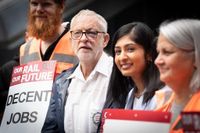Political tremors are shaking the foundations of British politics as Jeremy Corbyn and Zarah Sultana’s newly launched left-wing party, temporarily dubbed ‘Your Party’, continues to gather momentum across the UK. The party’s rapid growth, marked by surging sign-ups and a groundswell of grassroots enthusiasm, has triggered speculation about its potential to disrupt the traditional two-party system and reshape the country’s political future.
On July 3, 2025, Zarah Sultana made headlines by resigning from the Labour Party and publicly declaring her intention to join forces with Jeremy Corbyn in establishing a new political movement. According to Left Foot Forward, the party was soon described as being “rooted in communities, trade unions and social movements,” positioning itself as a voice for ordinary people. The timing was no accident: with Labour under pressure from both ends of the political spectrum and the centrist consensus splintering, the stage was set for a fresh challenge to the status quo.
Numbers tell a compelling story. By August 10, 2025, over 600,000 people had signed up to support the new party across the UK, according to Pembrokeshire Herald. That figure dwarfs the reported memberships of Reform UK (about 230,000) and even Labour itself (around 309,000). In Wales alone, more than 23,000 people have registered their support, reflecting what party organizers describe as “the strength and breadth of feeling across our communities for a new kind of political party.” Former Cynon Valley MP Beth Winter and ex-PCS union head Mark Serwotka are helping to lead the party’s Welsh operations, planning a tour of communities to consult with trade unions, campaigners, and residents on local priorities and policies.
Yet, the party’s ambitions reach far beyond Wales. The movement’s leaders intend to hold an inaugural conference soon, where policies will be set and a permanent name chosen. For now, the party’s stated mission is to create “a real alternative to poverty, inequality and war.” As quoted by Pembrokeshire Herald, organizers emphasize the need for a system that is not “rigged,” but responsive to the needs of ordinary citizens.
The emergence of ‘Your Party’ is not happening in a vacuum. As Left Foot Forward reports, Labour faces mounting criticism from within its traditional base. At the recent Durham Miners’ Gala, Unite’s general secretary Sharon Graham hinted at the possibility of the powerful trade union disaffiliating from Labour, saying the union could “forge a new vehicle for our class” and become “an authentic voice for the working class.” Still, a Unite spokesperson clarified that there have been “no discussions” about funding the Corbyn-Sultana party, and that the union remains bound by a 2023 vote to continue its Labour affiliation. Any decision to disaffiliate would not be made until the next Unite rules conference in 2027. For now, the union’s focus, according to Graham, is “on the jobs, pay and conditions of its members, not party politics.”
This stance hasn’t quelled speculation. Sources close to Corbyn, cited by The Times, have expressed confidence that Unite could eventually be persuaded to break with Labour and direct resources toward candidates from the new party. The union’s public statements, though, have been careful to distance themselves from “Westminster melodrama,” while still warning that “workers are feeling abandoned by Labour and the wrong choices it is making.” They point to a lack of a jobs plan, neglect of key industries like oil and gas, and Labour’s support for controversial “fire and rehire” tactics in Birmingham as evidence of a growing rift.
Meanwhile, the party’s formation is both a symptom and a catalyst of the ongoing fragmentation of British politics. As Pembrokeshire Herald notes, the UK’s political landscape is already crowded with challengers to the traditional duopoly—Liberal Democrats, the Green Party, UKIP, and Reform UK among them. Yet, the Corbyn-Sultana party’s rapid ascent in support and its appeal to disaffected Labour voters mark it as a particularly potent force. The party’s organizers claim that, if all sign-ups were to convert to paid memberships, it would instantly become the largest political party in Britain.
What does this mean for the next election? According to Left Foot Forward and Pembrokeshire Herald, the party’s impact could be significant, especially if it decides to field candidates in the 2026 Senedd elections or the 2029 General Election. Current polling in Wales suggests that Plaid Cymru is gaining ground at Labour’s expense, while Reform UK reports more members in Wales than the Conservatives. The addition of another national party could make upcoming elections among the most unpredictable in recent memory, particularly if it draws support away from Labour’s traditional base.
The party’s left-wing platform is unapologetically bold. Sultana has framed the next election as a choice “between socialism or barbarism,” invoking the words of Marxist thinker Rosa Luxemburg. The party’s emphasis on community, social justice, and anti-poverty measures resonates with many who feel left behind by mainstream parties. At the same time, the government’s promise to enfranchise 16- and 17-year-olds ahead of the next election could prove a game-changer, potentially boosting the new party’s youth support and influencing outcomes in closely contested seats.
However, the British electoral system remains a formidable obstacle. The first-past-the-post model is notorious for entrenching two-party dominance and making it difficult for new entrants to convert popular support into parliamentary seats. As Left Foot Forward observes, even a surge in membership or tactical coalitions may not be enough to overcome these structural barriers. Still, the party’s leaders and supporters are undeterred, arguing that a proportionally representative system would better reflect the country’s political diversity and give voters more meaningful choices.
Amid all the speculation, one thing is clear: the Corbyn-Sultana party’s rise is both a reflection of deep dissatisfaction with the current political order and a sign of the growing appetite for alternatives. Whether it ultimately breaks the grip of the two-party system or simply reshapes the margins, its influence is already being felt—in union halls, community centers, and the corridors of Westminster alike.
British politics, like the weather, is fickle and ever-changing. But as the new party prepares for its inaugural conference and the country heads toward a series of pivotal elections, all eyes will be on whether this grassroots movement can translate enthusiasm into lasting political change.





